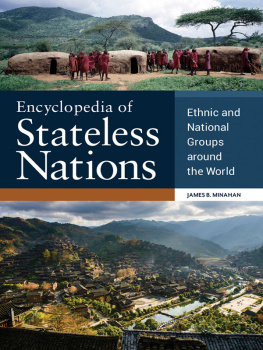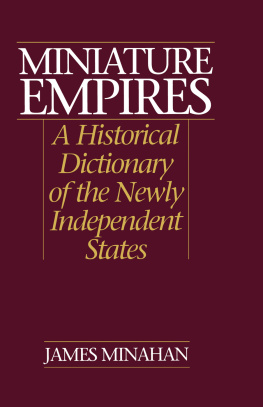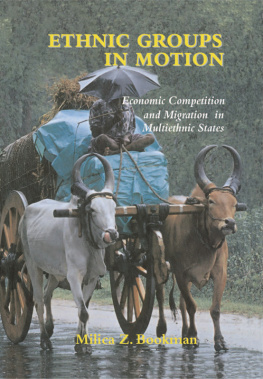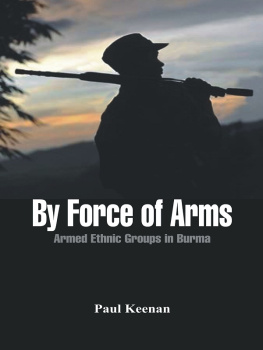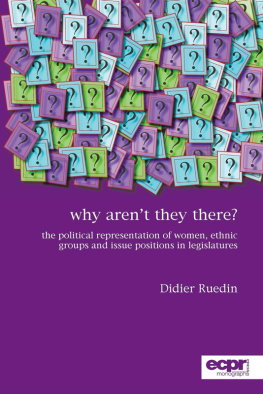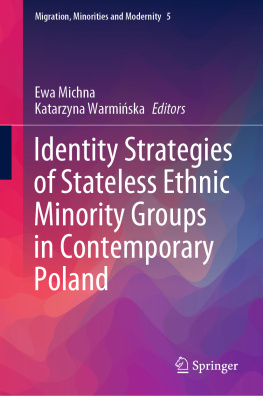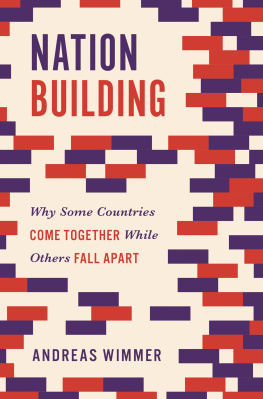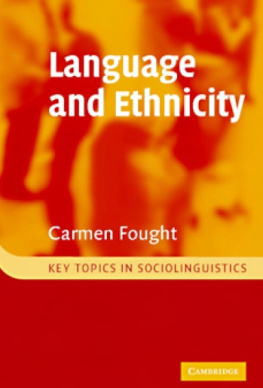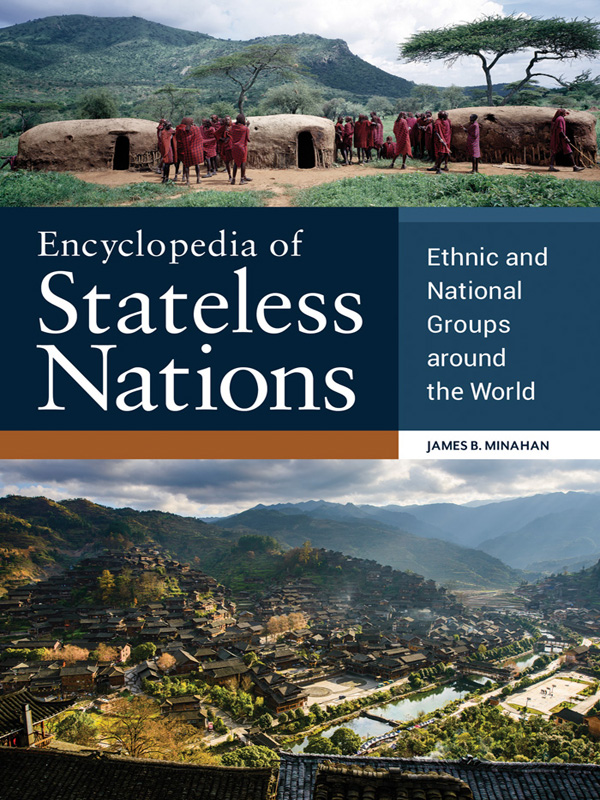Encyclopedia of Stateless Nations
Copyright 2016 by ABC-CLIO, LLC
All rights reserved. No part of this publication may be reproduced, stored in a retrieval system, or transmitted, in any form or by any means, electronic, mechanical, photocopying, recording, or otherwise, except for the inclusion of brief quotations in a review, without prior permission in writing from the publisher.
Library of Congress Cataloging-in-Publication Data
Names: Minahan, James, author.
Title: Encyclopedia of stateless nations : ethnic and national groups around the world / James B. Minahan.
Description: Second edition. | Santa Barbara, California : Greenwood, [2016] | Includes bibliographical references and index.
Identifiers: LCCN 2016002617 | ISBN 9781610699532 (print : alk. paper) | ISBN 9781610699549 (ebook)
Subjects: LCSH: World politics1989Dictionaries. | NationalismHistory20th centuryDictionaries. | Ethnic conflictHistory20th centuryDictionaries. | StatelessnessDictionaries.
Classification: LCC D860 .M56 2016 | DDC 909.8203dc23
LC record available at http://lccn.loc.gov/2016002617
ISBN:978-1-61069-953-2
EISBN: 978-1-61069-954-9
201918171612345
This book is also available on the World Wide Web as an eBook.
Visit www.abc-clio.com for details.
Greenwood
An Imprint of ABC-CLIO, LLC
ABC-CLIO, LLC
130 Cremona Drive, P.O. Box 1911
Santa Barbara, California 93116-1911
This book is printed on acid-free paper 
Manufactured in the United States of America
Contents
This volume represents the culmination of over a decade of research, planning, organization, and implementation as an updated and expanded sequel to the Encyclopedia of Stateless Nations: Ethnic and National Groups around the World, which was published in 2002. Since that time many peoples and groups around the world have joined the wave of modern autonomy and independence movements that have proliferated since the end of the Cold War in 1991. The Encyclopedia of Stateless Nations: Ethnic and National Groups around the World, Second Edition addresses a complex theme that has grown exponentially since 2000. This encyclopedia was prepared to provide readers with an easy-to-use, accurate, up-to-date guide to the ethnic and national groups seeking recognition, autonomy, or independence in our complicated contemporary world. The encyclopedia is presented as a quick reference to the confusing issues of national identity, religious and ethnic relations, regional conflicts, and immigration that are important factors in all levels of national and international politics.
The encyclopedia gives a brief summation of the development of 420 national groups from the beginnings of their histories to the present. The groups surveys are an essential guide to the many peoples and stateless nations of the twenty-first century striving for greater control of their lives and the future of their peoples in a rapidly shrinking world. Each entry highlights the historical, social, and religious evolution of the groups, many of which are mostly unknown to the outside world. The worth of the encyclopedia as a reference tool lies in the brief descriptions that form the basis of more intensive investigations, a starting point for further research.
The same general approach used in the 2002 encyclopedia was utilized to choose which groups to include. Selecting the groups presented numerous problems, not the least of which was the difficulty of applying a constant set of criteria that encompasses language, religion, history, culture, location, self-identification, and recognition or identification by outsiders. In general, strict adherence to recognized ethnic, national, or ethnoreligious groups presented by national governments as ethnicity and ethnic recognition are all too often subject to political considerations. If recognition by national governments were to be used as a criterion, groups in countries such as Japan, Turkey, or Greece could not be included as these and other governments deny the presence of national minorities within their borders.
The groups included in the encyclopedia are only a fraction of the many groups around the world that strive for greater recognition. The groups chosen for inclusion represent a perplexing diversity that share one important characteristic: They self-identity as a distinct people with enough cohesion to seek some sort of greater self-government. The task of researching this diversity is made more complicated by the lack of consensus on what constitutes a nation as opposed to a nation-state. As there is no universally accepted definition of nation, state, or country, the subject generates debates, tensions, and numerous conflicts.
The formation of a criterion for inclusion floundered on the numerous incongruities encountered while researching the subject. Size was discarded as many countries recognize and maintain diplomatic relations with Vatican City, just 108.7 acres in size, and the Sovereign Order of Malta, which has no national territory. Recognition by national governments or international organizations also had to be discarded. Ukraine, Belarus, and the Republic of China were all founding members of the United Nations in 1945, yet Ukraine and Belarus gained independence only in 1991, and the Republic of China, which controls only one province, Taiwan, remains a sovereign state though expelled from the United Nations in 1971. Active membership in international organizations such as the International Olympic Committee or the Organization of African Unity does not signify political independence. International recognition is also discarded as a criterion as the State of Palestine and the Saharawi Arab Democratic Republic are recognized by numerous national governments but in practice are not independent states, yet others such as Somaliland control national territories, have democratic national governments, and have all the trappings of independence but are not internationally recognized.
The definitions of people, nation, group, ethnicity, nationality, and minority are all fraught with controversy. Websters Unabridged Dictionary defines the word nation as a body of people, associated with a particular territory, that is sufficiently conscious of its unity to seek or possess a government particularly its own. Using this definition as the basis for selecting groups for inclusion, the criteria were narrowed to just three important elements: (1) self-identification as a group, (2) the display of the outward trappings of group unity, particularly the adoption of a flag, and (3) the formation of at least one political grouping or organization that reflects the groups claims or demands for recognition, self-government, or independence. Self-identification, how the individuals view their ethnicity or group, is the most important factor, although a universal consensus is almost unheard of, even among long-established nation-states. The outward trappingsthe flags, shields, coats of arms, logos, emblems, symbols, and colors adopted by groups seeking to upgrade their statusare increasingly important in the era of instant communications and miniaturized personal electronic devices. The formation of cultural, autonomist, nationalist, or separatist organizations is also a very important step in the growth of ethnic or national consciousness, though this category also includes armed groups or armies using violence to press their cases for rights, recognition, or independence. Many groups were eliminated from the encyclopedia if one of these three factors was not encountered during the exhaustive research process.

